#PEO Comparison
Explore tagged Tumblr posts
Text
Friends, I think we need to talk about Covid.
I want to get a few caveats out there before I start:
I am aware that there are people who need to exercise extreme caution about Covid; I live with someone who has two solid organ transplants and who is at the most immune compromised level of immune compromised. *I* have to be extremely cautious about covid.
Masking does prevent a certain level of transmission, and people who think they may have covid should mask and people who are concerned that they may be at high risk for covid should mask.
You should be vaccinated and boosted with the most recent vaccines that are available to you; covid is highly transmissible and very serious, you do not want to get covid and if you do get covid you don't want it to be severe and if you do get covid you don't want to give someone else covid and up-to-date vaccinations are the best way to reduce transmission and help to prevent severe cases of Covid.
We should be testing before going to any gatherings, and informing people if we test positive after gatherings, and testing if we suspect we have been exposed.
It is bullshit that there aren't good protections for workers who have covid; you should not be expected to go to work when you are testing positive
It is bullshit that people who are testing positive are not isolating for other reasons; if you have Covid you should not be going out and exposing other people to it even if you are experiencing mild symptoms or no symptoms.
We do need better ventilation systems for many kinds of spaces. Schools need better ventilation, restaurants need better ventilation, doctor's offices and hospitals and office buildings need better ventilation and better ventilation can reduce covid transmission.
I want to make it clear that Covid is real and there are real steps that individuals and systems can take to prevent transmission, and that there are systems that are exerting pressures that needlessly expose people to covid (the fact that you can lose your job if you don't come in when you're testing positive, mainly; also the fact that covid rapid tests should be ubiquitous and cheap/free and are not).
All of that being said: I'm seeing some posts circulating about how we're at an extremely high level of transmission and the REAL pandemic is being hidden from us and, friends, I'm pretty sure that is just incorrect and we're spreading misinformation.
I'm thinking of this video in particular, in which the claim is made that "your mystery illness is covid" in spite of negative tests. The guy in the video says that there's nothing else that millions of people could be getting a day, and that he predicted this because a wastewater spike in December meant that there was a huge spike in cases.
I've also seen people saying that deaths are where they were in 2021-2022, and that we're still at "a 9/11 a week" of excess deaths and friends, I'm not seeing great evidence for any of these claims.
I know that we (in the US, which is where the numbers I'm going to be citing are from) feel abandoned by the CDC and the fact that tracking cut off in May of 2023. But that only cut off for the federal tracking.
I live in LA county and LA county sure as shit is still tracking Covid.

If you want a clearer picture, you can see the daily case count over time compared to the daily death count:
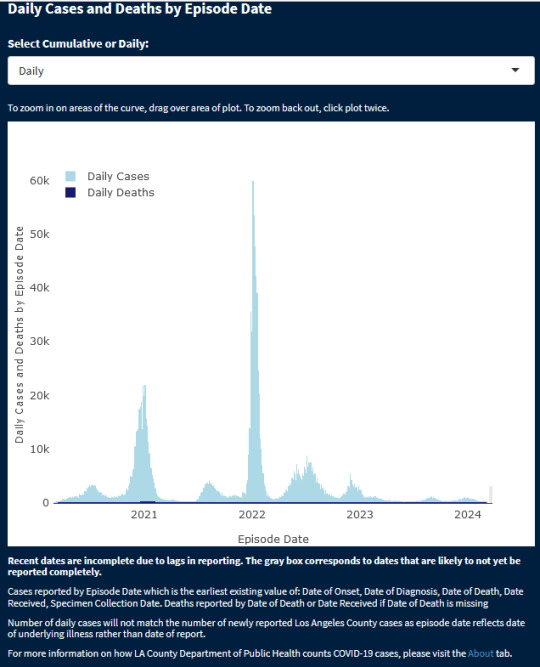
Okay, you might say, but that's just LA.
Alright, so here's Detroit:
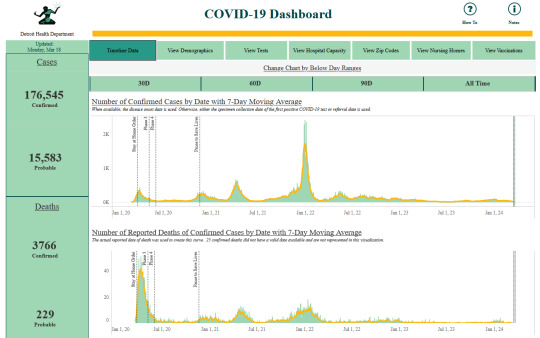
Right, but maybe that's CDC data and you don't trust the CDC at this point.
Okay, here's fatalities in New York tracked through New York's state data collection:
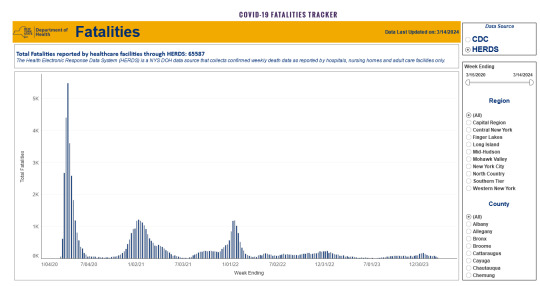
It's harder to toggle around the site for South Dakota, but you can compare their cases and hospitalizations and deaths for early 2022
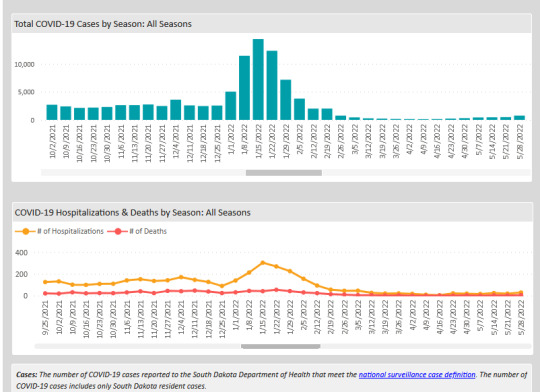
To cases and hospitalizations and deaths from early 2024
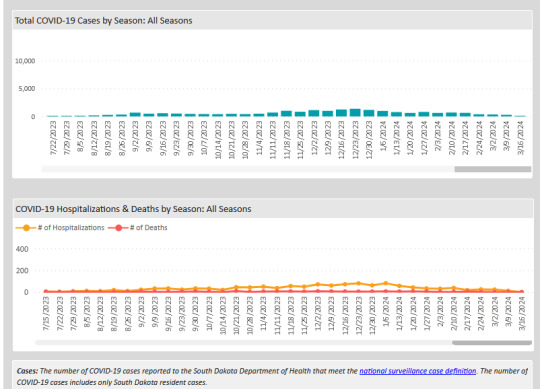
And see that there's really no comparison.
Okay, you might say, but people are testing less. If they're testing less of course we're not seeing spikes, and they're testing less because fewer tests are available.
Alright, people are definitely testing less than they were in 2021 and 2022. Hospitalization for Covid is probably the most clear metric because you know those people have covid for sure, the couldn't not test for it.
Here are hospitalizations over time for LA:

Here are hospitalizations over time for New York:
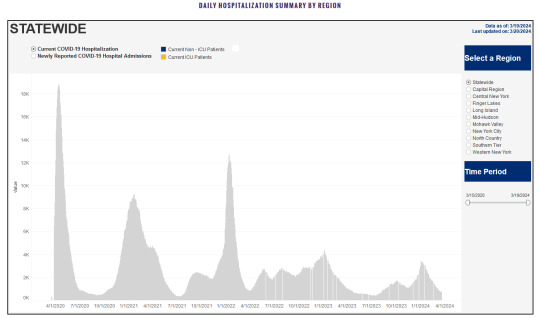
As vaccination rates have gone up, cases, deaths, and hospitalizations have gone down. It IS clear that there are case spikes in the winter, when it is cold and people are indoors in poorly ventilated spaces and people are more susceptible to respiratory infections as a result of cold air weakening the protection offered by our mucous membranes, and that is something that we will have to take precautions about for the forseeable future, just as we should have always been taking similar precautions during flu season.
So I want to go point-by-point through some of the arguments made in that video because I'm seeing a bunch of people talking about how "THEY" don't want you to know about the virus surge and buds that is just straight up conspiracism.
So okay, first off, most of what that video is based on is spikes in wastewater data, not spikes in cases. This is because people don't trust CDC data on cases, but I'd say to maybe check out your regional data on cases. I don't actually trust the CDC that much, but I know people who do tracking of hospitalizations in LA county, I trust them a lot more. Wastewater data does correlate with increases in cases, but this "second largest spike of the entire pandemic" thing is misleading; wastewater reporting is pretty highly variable and you can't just accept that a large spike in covid in wastewater means that we're in just as bad a place in the pandemic as we were in 2022. We simply have not seen the surge of hospitalizations and deaths that we would expect to see in the weeks following that spike in wastewater data if wastewater data was reflective of community transmission.
The next claim is that "there is nothing else that is infecting millions of people a day" and covid isn't doing that either. The highest daily case rates were in January of 2021 and they were in the 865k a day range, which is ridiculously high but isn't millions of cases a day.

But what we can see is that when people are tested by their doctors for Covid, RSV, and the Flu, more tests are coming back positive for the Flu. Covid causes more hospitalizations than the other two illnesses, but to be honest what the people in the video are describing - lightheadedness, dizziness, exhaustion - just sound like pretty standard symptoms of everything from covid to the cold to allergies. There are lots of things your mystery illness could be.
The video goes on to talk about the fact that people aren't testing, and why their tests may be coming back negative and I'd like to point out that the same things are all true of Flu or RSV tests. People might be getting tested too early or too late; getting a negative test for the flu isn't a good reason to assume you've got covid, getting a negative test for covid isn't a good reason to assume you've got the flu, and testing for viruses as a whole is imperfect. There are hundreds of viruses that could be the common cold; there are multiple viruses that can cause bronchitis; there are multiple viruses that can cause pneumonia, and you're not going to test for all of these things the moment you start feeling sick.
He then recommends testing for multiple days if you have symptoms and haven't had a positive test (fine) and talks about the location of the tests (less fine). Don't use your rapid tests to swab your throat or cheek unless it specifically says that they are designed to do so. Test based on the instructions in the packet.
He points out that the tests probably still pick up on the virus because they're not testing for the spike protein, they're testing for the RNA (good info!)
The video then discusses something that I think is really key to this paranoia about the "mystery illnesses" - he talks about how covid changes and weakens your immune system (a statement that should come with many caveats about severity and vulnerability and that we are still researching that) and then says that it makes you more susceptible to strep or mono and that "things that used to clear in a day or two now hit you really hard."
And that's where I think this anxiety is coming from.
Strep throat lasts anywhere from three days to a week. A cold takes about a week to clear. The flu lasts about a week and can knock you on your ass with exhaustion for weeks depending on how bad you get it. Did you get a cough with your cold? Expect that to take anywhere from three to eight weeks to clear up.
I think that people are thinking "i got a bad virus and felt really sick for a week and haven't gotten my energy back" but that just sounds like a bad cold. That sounds like a potent allergy attack. That doesn't even sound like a bad flu (I got a bad flu in 2009 and thought i was going to straight-up die I had a fever of 103+ for three days and felt like shit for three days on either side of that and took six weeks to feel more like myself again).
Getting sick sucks. It really, really sucks. But if you're getting sick and you're testing for covid and it's coming back negative after you tested a few times, it's almost certainly not covid.
The video then says "until someone provides evidence that it's not covid, it should be assumed to be covid because we have record levels of covid it's that simple" but that's not simple. We don't have record levels of covid and he hasn't proved it. We have record high levels of wastewater reports of covid, which correlates with covid cases but the spike in wastewater noted in december didn't see a spike with a corresponding magnitude of cases in terms of either hospitalizations or deaths, which is what we'd have seen if we had actual record numbers of covid.
He says that if you want to ignore this, you'll get sick with covid, and that about 30-40% of the US just got sick with covid in the last four months (which is a RIDICULOUSLY unevidenced claim).
He says that we need to create a new normal that takes covid into account, which means masking more often and testing more often and making choices about risk-avoidant behaviors.
Now, I don't disagree with that last statement, but he prefaces the statement with "it doesn't necessarily mean lockdown" and that's where I think the alarmism and paranoia is really visible here. We are so, so far away from "lockdown" type levels that it's absurd to discuss lockdown here.
What I'm seeing right now is people who are chronically ill, people who are immune compromised, and people who are experiencing long covid (which may not be distinct from other post-viral syndromes from severe cases of flu, etc, but which may be more severe or more notable because of the prevalence of covid) are talking about feeling abandoned and attacked and left behind by society because covid is still out there, and still at extremely high levels.
I am seeing people who feel abandoned and attacked because the lgbtq+ events they are attending don't require masking. I am seeing people who are claiming that it is eugenicist that their schools don't have a negative test policy anymore.
And this comes together into two really disconcerting trends that I've been observing online for a while.
The claim that the pandemic is still as bad as it's ever been and in fact may be worse but we can't know that because "they" (the CDC, the government, capitalist institutions that want you back in the office, the university industrial complex that wants your dorm room dollars) are covering up the numbers and
Significant grievance at the fact that people are acting like number one is not true and are putting you at risk either out of thoughtlessness (because they don't realize they're putting you at risk) or malice (because they don't care if the sick die).
And those things are a recipe for disaster.
I think I've pretty robustly addressed point one; I don't think that there's good evidence that there's a secretly awful surge of covid that nobody is talking about. I think that there are some people who are being alarmist about covid who are basing all of their concern on wastewater numbers that have not held up as the harbinger of a massive wave of infections.
So let's talk about point number two and JK Rowling.
Barnes and Noble is not attacking you when it puts up a Hogwarts Castle display in the lobby. Your favorite youtuber isn't trying to hurt you when they offhandedly mention Harry Potter.
If you let every mention of Harry Potter or every person who enjoys that media franchise wound you, you are going to spend a lot of your time wounded.
People are not liking Harry Potter at you.
Okay.
People are also not not wearing masks at you.
You may be part of a minority group that experiences the potential for outsized harm as a result of majority groups engaging in perfectly reasonable behaviors.
There are kind, well-meaning, sensible people who go out every day and do something that may cause you harm and it's not because they want to hurt you or they don't care about whether you live or die, it is because they are making their own risk assessments based on their own lives and making the very reasonable assumption that people who are more concerned about covid than they are will take precautions to keep themselves safe.
We are not at a place in the pandemic where it is sensible to expect people with no symptoms of illness to mask in public as a matter of course or to present evidence of a recent negative test when entering a public building in their day-to-day life.
I think now is a really good time to sit down and ask yourself how you expect things to be with covid as an endemic part of our viral ecosystem. I think now is a good time to ask yourself what risk realistically looks like for you and for people who are unlike you. I think now is a good time to consider what would feel "safe" for you and how you could accomplish feeling safe as you navigate the world.
I'm probably going to continue masking in most indoor spaces for years. Maybe forever. There are accommodations that SHOULD be afforded to people who have to take more precautions than others (remote learning, remote visits, remote work, etc.), and we should demand those kinds of accommodations.
But it is going to poison you from the inside out if you are perpetually angry that people who don't have the same medical limitations as you are happy that they get to go shopping with their faces uncovered.
So now I want to talk to you about my father in law.
My father in law had a bone marrow transplant in 2015. That's the most immune compromised you can get without having your organs swapped out.
The care sheet for him after the transplant was a little overwhelming. The list of foods he couldn't eat was intimidating and the limitations on where he could go was depressing. It cautioned against going to large events, it recommended outdoor gatherings where possible but only if he could avoid sunlight and was somewhere with no history of valley fever. It said that he should wear masks indoors any time he was someplace with poor ventilation and that he should avoid contact with anyone who had an illness of any kind, taking special note to avoid children and anyone recently vaccinated for measles.
It was, in short, pretty much what someone immune compromised would need to do to try to avoid a viral infection. Sensible. Reasonable. Wash your hands and social distance; wear masks in sensitive contexts and don't spend time in enclosed places with people who have a communicable illness.
This is what life was always going to be like for people who are severely immune compromised, and it was always going to be incumbent upon the person with the illness to figure out how to operate in a society that is not built with them in mind.
It is not the job of every parent I encounter to tell me whether their child has been vaccinated against measles or chicken pox in the last three months. That isn't something that people need to do as part of their everyday life. However it IS my responsibility to check with the parents I'm hanging out with whether their children have been vaccinated against measles or chicken pox in the last three months so I know if it's safe for my immune compromised spouse to be around them.
If you want an environment in which you feel safe from covid, at this point in the pandemic (when the virus is endemic and not spreading rapidly as far as we can see from case counts) it is your responsibility to take the steps necessary to make you feel safe. Some of those steps will involve advocating for safety improvements in public spaces (again, indoor ventilation needs to be better and I'm personally pretty extreme about vaccination requirements; these are things we should be discussing in our school board meetings and at our workplaces), some of those steps will involve advocating for worker protections, guaranteed sick time, and the right to healthcare. But some of the things you're going to need to do to feel safe are going to come down to you.
If you are concerned about communicable diseases you have to be realistic about the fact that our society doesn't go out of its way to prevent communicable diseases - norovirus among food service workers pre-pandemic is pretty clear evidence of that. You are going to have to be proactive about your safety rather than expecting the world to act like Covid is at 2021-2022 levels when it is measurably not.
6K notes
·
View notes
Text
Ministry of Magic: Part 3/?
The Minister for Magic
Or alternatively, why would anyone elect Cornelius Fudge? How can the minister be replaced so quickly? When are the elections? Who can become minister? And other questions I'm unsure anyone other than me ever asked!
There is some headcanon and speculation on my part, but as usual I stay as close to the evidence we are given as I can.
I covered here and here how I think the Wizengamot and the whole process of law-making in the wizarding world is not a modern democracy. It actually works very similarly to older forms of government in England. Now, the Minister of Magic is a little different since it's a position that doesn't have a clear-cut muggle equivalent.
Yes, JKR seems to have intended the minister of magic to essentially be the magical prime minister, after all the first chapter of HBP is titled: "The Other Minister" drawing this comparison. and the minister of magic is in a way the wizards' prime minister, but not quite.
The Title of Minister
The title itself "Minister of Magic" and "Ministry of Magic" sounds like he is the head of a specific department within the UK Cabinet, just like the Ministry of Defence or the Ministry of Justice. This part fits one of the statements about the ministers of magic from Pottermore:
Generally speaking, and despite many a moan and grumble, their community is behind them in a way that is rarely seen in the Muggle world. This is perhaps due to a feeling, on the part of wizards, that unless they are seen to manage themselves competently, the Muggles might try to interfere.
(From Pottermore)
Basically, the muggles do have a say over the Ministry of Magic since they were founded as technically part of the muggle cabinet. This also creates an odd hierarchy where technically the Minister of Magic is immediately under the supervision of the muggle Prime Minister, although, over the years, this position became less and less relevant.
So, while officially, the minister of magic is essentially a secret minister in the muggle cabinet, and therefore under the authority of the muggle prime minister, they don't act this way. They probably never have, but I still find it interesting.
How is the minister elected?
According to Pottermore, this is how ministers are elected:
The Minister for Magic is democratically elected, although there have been times of crisis in which the post has simply been offered to an individual without a public vote (Albus Dumbledore was made such an offer, and turned it down repeatedly). There is no fixed limit to a Minister’s term of office, but he or she is obliged to hold regular elections at a maximum interval of seven years.
(From Pottermore)
Basically, there isn't really a method that's always true. The first Minister, Ulric Gamp was the Chief Warlock of the Wizengamot and the founder of the Ministry of Magic. As such, Gamp was likely elected from within the Wizengamot, and not in what we'll think of as modern democratic elections.
I'd like to point out how there is no limit to how long a minister can stay in office, but elections have to happen every 7 years (or sooner, but I assume most ministers don't try to shorten their own terms). Although this Pottermore article states that the Minister of Magic tends to be a stable position, I went through the list of ministers to see how stable they actually are (I only used the ministers up to Fudge to not skew the history with the most recent war that saw two consecutive very short terms). The average term for a minister of magic is 9 years, with the majority serving 8 or 11 years, meaning almost all ministers left office for a reason other than elections. 27 were ousted from office mid-term, and only 5 were replaced in their elections. (The average counts the one minister that served for 36 years btw). So, while ministers were stable, it's not that the wizarding world as a whole is as stable as Pottermore is implying.
The fact the position is occasionally offered to people in times of crisis (which begs the question, who defines that?) is incredibly odd, and I'll talk about that more later. First I want to cover what democratic elections in the wizarding world look like and what it means. How does campaigning work and who are you really electing.
Many modern democratic countries have you elect a party and not an individual. The Wizarding World doesn't look to have parties. And, as I already talked about the Wizengamot in a former post, their parliament is not elected, therefore, there isn't really a point for a party as they don't need a list of wizards to fill in the coalition and the opposition. They just have the same inherited council and a minister, that is elected separately, and the minister's stuff, which the minister seems to have complete control over.
So, the ministers seem to be chosen on an individual basis, and not on a party basis.
I collected all quotes I could find regarding the minister in the books to see if it'll shed more light on the elections themselves and how candidates are picked.
We hear that Fudge was elected and made a statement after his election:
Cornelius Fudge, the Minister for Magic, denied that he had any plans to take over the running of the Wizarding Bank, Gringotts, when he was elected Minister for Magic five years ago. Fudge has always insisted that he wants nothing more than to "cooperate peacefully" with the guardians of our gold.
(OotP, Quibbler)
Similarly, Lee makes a reference to having a vote:
“I’d say that it’s one short step from Wizards first’ to ‘Purebloods first,’ and then to ‘Death Eaters,’ ” replied Kingsley. “We’re all human, aren’t we? Every human life is worth the same, and worth saving.” “Excellently put, Royal, and you’ve got my vote for Minister of Magic if ever we get out of this mess,” said Lee. “And now, over to Romulus for our popular feature ‘Pals of Potter. ’ ”
(DH)
All this leads me to believe the elections for the Minister of Magic aren't too different from elections many of us would be familiar from the real world. It seems everyone who is an adult wizard is allowed to vote. I'd guess goblins, elves, and other creatures do not get a vote. I'm uncertain of whether squibs and werewolves can vote for the minister, but my guess would be that they can't if they are registered werewolves/squibs. So the elections in the Wizarding World are pretty selective on voting rights. you can probably vote only if you have a wand.
Ignatius Tuft (in office 1959 - 1962) is stated on Pottermore to have made promises and gained popularity in his elections. This means that like we see in the real world, candidates run campaigns to ammas support and voters. Some ministers in the article like Unctuous Osbert (in office 1789 - 1798) were noted to be influenced by pure-blood wealth. This means that like in the real world, ministers receive monetary support and potentially bribes.
As the ministers are elected via popular vote, it could explain why Fudge got elected. We see him as a bumbling buffoon of a minister who tries to deny the return of Voldemort and an antagonist in the books. Now, I'm not going to say Fudge is a good minister, but he was probably a likable one, which is more important for elections that run on which candidate you like better.
I have no evidence I found to indicate how you become a candidate for being a minister, but clearly, what you need to get elected is to be well-liked and seen favorably. This is something Fudge could probably do well enough as long as he doesn't have strong competition. A lot of Minister choices Pottermore lists are reactionary, meaning people choose a minister that fixes something that happened during the last minister's term.
Fudge came after Millicent Bagnold, who was very positive in the public's mind. She didn't seem to have done much of anything in her time besides allow wizards to endanger the Statue of Secrecy while celebrating Voldemort's fall. Fudge, probably, appeared similar to her, as a silly, likable man who just wanted to continue years of peace after the war in the 1970s. So, I can kinda see why he could get elected. Especially if Dumbledore supported his election (seen as a well-liked, Chief Warlock and past war hero in 1990 when Fudge was elected).
In Philosopher's Stone, Hagrid says as follows:
“’Course,” said Hagrid. “They wanted Dumbledore fer Minister, o’ course, but he’d never leave Hogwarts, so old Cornelius Fudge got the job. Bungler if ever there was one. So he pelts Dumbledore with owls every morning, askin’ fer advice.”
This suggests Dumbledore did help Fudge in his campaign to become a minister and his first years as minister. This probably helped Fudges stand quite a bit.
The above quote also possibly suggests the ministry (or Wizengamot, more on that later) offered Dumbledore the position 10 years after the war and not just during a "time of crisis".
Similarly in Deathly Hallows, it's stated Dumbledore was offered the position of minister multiple times throughout the years, again, putting into question the "times of crisis" bit:
Dumbledore’s future career seemed likely to be meteoric, and the only question that remained was when he would become Minister of Magic. Though it was often predicted in later years that he was on the point of taking the job, however, he never had Ministerial ambitions.
(DH)
And when the ministers are replaced in quick succession, from Fudge to Scrimgour to Thicknesse to Shacklbolt, it seems no elections took place:
“The coup has been smooth and virtually silent,” said Lupin. “The official version of Scrimgeour’s murder is that he resigned; he has been replaced by Pius Thicknesse, who is under the Imperius Curse.” “Why didn’t Voldemort declare himself Minister of Magic?” asked Ron.
(DH)
and that Kingsley Shacklebolt had been named temporary Minister of Magic...
(DH)
This took place during a war with Voldemort, or right after it, so it definitely counts as a "time of crisis" and explains why we don't see any elections in the books although the ministers get switched out on a yearly basis by the final books. However, from the Dumbledore example, it seems a time of crisis might not be necessary to offer someone the position of minister.
If I had to guess who chooses the minister, sans an election, my bets would be on the Wizengamot. The Witenagemot, the ancient English council the Wizengamot is named after used to do just that.
The Witenagemot had the power to elect the next king of England from the extended royal family and not just in the direct line of succession. Once they did elect a king though, they were beholden to said king's rule.
So, I believe that the Wizengamot has an old rule that allows them to choose a new minister (as long as said minister agrees). They are probably also the ones who determine what is a "time of crisis" and when they can forgo a regular public election.
Once a minister is chosen though unless something very extreme happens (like the war with Voldemort) the Wizengamot is subordinate to the minister and the minister has complete authority over them.
Who can be the Minister?
Well, it seems pretty much any witch or wizard could become Minister of Magic. Nobby Leach was the only muggleborn Minister in Britain, but the fact a muggleborn could become the minister shows it's a position more open for social mobility, unlike most ministry positions (most likely because of the wide public elections).
Another note that showcases the more mobile ladder to becoming minister is Leonard Spencer-Moon who was noted to have been a tea-boy in the ministry at the start of his career.
That being said, the majority of ministers have been well-connected pure-bloods, so the above two examples are more the exception than the norm. And I assume that like with voting, squibs and werewolves probably can't become ministers of magic.
What exactly does the position entail?
From what we see, the Minister seems to have control over everything. Fudge could decide where the dementors go, and could execute whoever he felt like (Barty, Sirius) with, like, no trial and no consequences. In OotP Fudge drafted and executed law bills on his own, and probably more instances I do not recall at the moment.
Basically, the Minister can do whatever he wants and seems to be able to override everyone else in the ministry, including the Wizengamot. I believe the Wizengamot could vote to remove a minister from office the same way they can vote one in without elections, but while the minister is in office, they are the sole highest authority of the wizarding world in the UK.
Just as stated in the Pottermore article:
All matters relating to the magical community in Britain are managed solely by the Minister for Magic, and they have sole jurisdiction over their Ministry.
(from Pottermore)
So, it seems the minister's rule and jurisdiction is basically anything the minister decides they want to have control over. From laws to trials to education to sports to literally everything else.
The same Pottermore article I linked throughout this post includes a list of all Ministers of Magic and it's clear each one of them, just, followed their interests. Some founded the department for games and sports and advocated to hold the Quidditch World Cup in Britain, others worked to outlaw marrying muggles, and some, just, didn't do anything. So, it's just a very general position that allows you to determine the priorities of the whole ministry and actually override parliament (Wizengamot/Confederation of Warlocks).
I just thought all this was interesting since I enjoy fictional politics...
#harry potter#hp#hp meta#harry potter meta#hollowedtheory#hollowedheadcanon#ministry of magic#wizarding world#wizarding society#wizarding world of harry potter#the wizarding world is a dystopia#wizarding politics
27 notes
·
View notes
Note
are they associated with a certain color? what color do they wear the most?
what sort of music would they like? have you thought about what genres or bands do they lean towards? do they have a favorite song?
favorite animal? why?
do they have a nickname? who gave it to them? if it's not derived from their real name, what's the story behind it?
favorite food? least favorite? are they a picky eater? do they have any dietary restrictions?
what do they have in common with you? how are they different? would you get along with them?
are they any good with numbers?
their opinion on lying, stealing, and killing?
are they quick to anger? what sets them off?
how would you describe their voice? can they sing?
how good/bad is their hearing? what about their eyesight?
how do they move? are they clumsy? light on their feet? do they use mobility aids?
do they smell like anything notable?
do they like receiving gifts? giving gifts? what is their ideal gift?
do they have any habits that aren't particularly self-destructive, just maybe odd?
how would your character describe themselves? it doesn't have to line up with how they really are.
For Nancy and Charin Gemm? 🥺🥺
omgmgmgmmgmg
1. okok so Nancy is totally Red color. And she has a lot of clothes in that color or similar, like pink or something like that. Charin has clothes in all colors because he's silly like that, but the specific color is probably brown
2. I always imagined they would listen to jazz or electro swing tbh. While Nancy would be okay with everything, Charin would complain about most things that weren't on his playlist. He doesn't have a playlist, he just uses it as an excuse to complain about every sound he doesn't like. I don't think they have a favorite band, they just listen to the local ones like "Jazz-squatch and the howling cryptids" or something. They both probably prefer something without lyrics, because then they don't have to think about the words.
3. Nancy accepts any animal, Charin likes cats. As long as those cats don't try to skin him.
4. They don't have any but Nancy calls Charin "Char" because she thinks a serious name doesn't suit him
5. fave food. Uhh. Nancy is the type of person who will eat anything, Charin is the type of person who will only eat what Nancy cooks. Are these restrictions? He sets them himself by saying that nothing else tastes good to him.
6. Listen, they were created on Christmas Eve when I was trying to cope with a panic attack in the bathroom. Guess if they have anything in common with me, bro
7. Nancy is good at math and general thinking, but she forgets dates like wedding anniversaries and birthdays. Charin, on the other hand, only remembers things about them, completely ignoring everything else.
8. Stealing? If you need something and can't afford it, steal. Lying? It's worse here, they're okay with lying to strangers but if they lie to each other then it creates some real shit. Killing? They don't think about it too much? Of the two of them, Charin is more shocked by this than Nancy.
9. Nancy is the type of person who looks calm until you cross the line and then the demon gets into her and she doesn't need lemons to burn down your house. Charin gets mad faster but he's not very good at talking so Nancy usually comes to take his side in arguments with others anyway
10. Both can sing. Nancy has a voice similar to Oktavia on YouTube (channel with songs) and uh. Charin maybe sounds kinda like idk, Crane from King fu Panda? Very random comparison tbh 💀
11. Eyesight. Nancy literally wears glasses, but she can do without them unless she has to read or thread needles. She has good hearing. Charin has great eyesight and hearing lmao
12. They don't have any problems? They walk great, especially since they both wear heels :p
13. Charin like a tree, fireplace, hot chocolate etc. Nancy probably like fresh laundry XD
14. they give gifts to each other often but they are not the best at giving them to others. Nancy just bakes cakes for other people and Charin jumps on it as if they were giving it together. Accepting gifts from others is a bit awkward but they are happy when it is useful things like porcelain or pots
15. Charin has a box of rocks under the bed. And gems too. In the bedroom, there are often stones arranged on shelves by him, but never ask what determines their order, because he will give you a whole day essay on this subject. Nancy doesn't seem to have anything like that.
16. Nancy "You know, that one neighbor who you know lives on your street but who you've only seen twice in the store. "
Charin "Mr. Don't-pay-attention-to-me-because-I-won't-tell-you-anything-anyway"
lmao i dont believe u send me all od them
5 notes
·
View notes
Text
Thing that drives me completely insane in the news, on social media, and generally in the way people discuss age groups, is how unquestioningly we accept the idea of "generations" as sequential statistical cohorts with distinct cultures and mindsets.
The idea of understanding generations as things that are Named and which follow each other in sequential blocs entered popular culture as what Wikipedia terms "Strauss-Howe Generational Theory", which was cooked up in the 1990s by the aforementioned William Strauss and Neil Howe, for a series of pop-science books. Their books had the, bluntly, extremely shoddy hypothesis that you can trace generations' mindsets in the United States as a repeating four-part hundred-year cycle back to the early modern period, with each generation forming a mindset due to growing up in the conditions created by the previous one.
The premise barely even resembles coherent historical or sociological scholarship, and could at most be generously described as "vibes-based". It's U.S.-centric as all hell; following it out would suggest that the history of Anglo-American generational mindsets is the singular axis on which the world turns, and they themselves essentially argued that the Great Depression and World War II were a "Crisis" produced by American cultural cycles. There is a built-in hole by the authors' own admission in 1844-1860, where they couldn't quite explain how the goddamn antebellum period, i.e. one of the singularly most-studied periods in American history, slots into their narrative. It's broad enough to make Victorian political theorists who saw history as the story of technological and moral progress look nuanced and discerning by comparison.
The real reason for their hypothesis was to pitch the idea that millennials* would grow up to be conservatives and to affirm turn-of-the-millennium conservative fears, claiming that there would be a world-historical crisis on the scale of World War II around 30 years after they published their books, which the emboldened conservative youth would then heroically overcome.† To give you an idea of how cartoonishly obviously these guys were working backwards from the thesis "things are looking up for social conservatism", this is an excerpt from a review of their book Millennials Rising: The Next Great Generation, from NEA Today in 2000:
Millennials are returning to conservative family values, emphasizing cooperation rather than creativity, and showing a new respect for rules. [...] And today's young people have stricter attitudes about sex than their elders, with virginity being a cool new trend.
In other words, it is at this point objectively bullshit.
All this nonsense might sound wildly disconnected from how the terms are used today but Strauss and Howe have been insanely successful at shaping how people think of generations more broadly--the commentariat is to this day obsessed with talking about "This Hot New Gen Z Trend" and "What Millennials Are Doing Differently Than Their Parents" I think this broader reshaping of how generations are understood is also related to why people argue about these things online so much, why there's constant discourse on what generation things are "nostalgia" of, and people cooking up weird subterms like "elder millennial" and "zillennial". Fundamentally, putting aside the concept's methodological and ideological original sins, breaking people up into these artificial 20 year chunks and erecting walls between them is a really poor way to understand the fluid way age and culture interact. Which is, incidentally, one of the many reasons why practically nobody in the academic historical or sociological communities considers it an accurate or useful way of understanding history or culture.
*addendum: you know how the start and end years of "generations" are frequently wildly unclear, say, how depending on who you ask gen z starts anywhere from 1995 to 2005? according to strauss and howe the last millennials were the people who graduated high school in 2000 lmao
†addendum 2: i have seen some places, including the incredibly credulous Wikipedia page, characterize the COVID pandemic or the russia-ukraine war as the predicted "crisis" formative to gen z, which is both obviously stupid and also pretty on track for the theory that posits a central historical cause of World War II to be World War I's psychological effects on the children of the Americans who served in it
#also not helping is that the Wikipedia article for the subject is the pet project of true believers & makes it seem more legit than it is#anyway sorry for the long post. i find the subject maddening and saw a fresh volley of generations discourse on twitter earlier today#gen z#millennials#rant
2 notes
·
View notes
Note
(I didn’t mean to insult your girlfriend I’m sorry 🙏) but I’ve thought about smthg… it’s so funny how parents in JSHK never care about their children
*chuffing* as long as you're sorry...
(for future reference: I don't really know how to engage in an ask saying 'I like [thing] more than [your favorite thing]'... I'd prefer it if instead we could talk about a subject on it's own, not in comparison to My Thing. I like Sumire plenty, she is quite pretty. But Nene is my favorite, like how all aspects of my ship are my favorite thing in this manga, & I don't really get anything from hearing about preferences that I don't have, stated at me — there's not really a 'discussion' to be had... bc there's not even a question being posed..? Anyways, hope that illuminates something.)
Oh you know, it's funny, I moreso get the impression that Iro-sensei isn't really interested in parents as characters... so we don't really get many instances of them being incredible caretakers. We definitely have a skew of, various cases of neglect, or (as I suspect for Teru's upbringing) physical abuse — but I wouldn't say that all of the parents are deadbeats lol.
I assume that Nene's home life is perfectly fine, as it doesn't seem to trouble her at all. Her parents are by her side on her first day of middle school (unlike the Yugi or Minamoto, more fraught cases) and Nene seems to be able to pursue her own hobbies, fill her room with things she likes, etc. It's not that owning lots of things means that parents are good, but combined with Nene showing no notable distress about home life, I think it's indicative of them being willing to accommodate her personal tastes. Mommy and daddy will buy you ghoul toys, give you shopping money to buy cute clothes, let you stay out after school and go to Tanabata, so on and so forth. I think of Nene's parents as loving in a... neutral? Way? I don't think they are going above and beyond for her, necessarily, but she seems to have had a normal childhood and expects nothing from them. I'm not sure if there's even any expectations on her wrt future careers. Which imo, would be to purposefully contrast the Yugi, who likely had a strenuous home life alongside expectations for Amane's impending science-focused future.
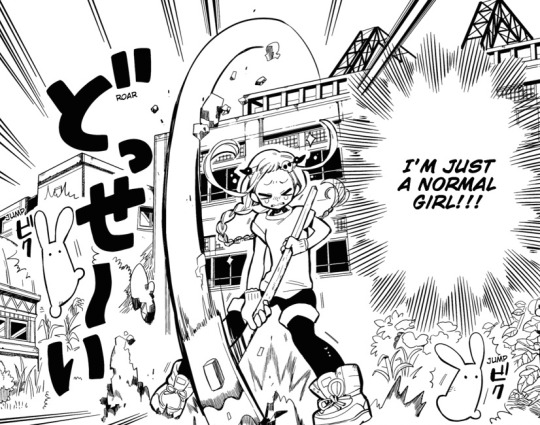
Ahh, I believe her, you know. It's her distinct swag. Normal girl swag. She has been a normal girl living a normal life until she meets Amane...
Nene's problems lie in her peer-to-peer relationships. She's not able to make many friends, and is seen as weird and eccentric. A bit homely, not alluring, which means her chances at romance are slim... Which troubles her, because she's romance obsessed and really really wants to be in a relationship. I always ah, think it says a lot, that Nene's fear manifested in the Hell of Mirrors is everyone laughing at her about how she is unattractive and no one will ever want her. That's... simply her greatest concern in life... Being attractive enough... Yk I really feel for her though, I know a lot of people would see it as shallow, but I respect that this is just how she is. She can't, ignore it-!! But yk, I also love the fact that Nene doesn't seem to think very hard about her family... It's interesting, because she's otherwise a considerate girl, who cares when innocent people are in harm's way. But ah... she still doesn't factor in her parents' misery at the thought of her never returning from the Far Shore? This decision is so interesting. While fraught families can leave characters with lasting complications, which we can explore deeply... I also am very interested in when an individual has 'no reason' to resent their family — and they don't! — but they also do not seem to care deeply about them. When push comes to shove, Nene is willing to sacrifice everything she has for Amane... which is, in reality, what really sets her apart. Her romanticism goes beyond what a 'normal person' would do.
It is, in reality, easier to leave people who have been cruel to you, than people who have never really done you wrong, because they don't 'deserve' that. Nene is an only child, what if she is valued and loved by her parents...? What if she's their pride and joy, what if she makes them very proud? Well, it just deosn't matter, anyways. Which is selfish, in a way... but I like that. It doesn't matter if you should care about your parents hard work. What if you just, don't-? In Bakeneko Ryokan, Nene is a fancy, extravagant breed of cat, and her owner clearly loved her, enough to name her 'Pretty-chan', enough to put out a flyer to find her after she went missing. But, ehm, Nene simply left... in search of hot guys, to fawn over her...... I think this probably sums up what's going on in canon lol. Loved child, but ultimately this can't take up space in her heart.
Moving on from Nene... Mitsuba's mom seems like a well-meaning woman, as well. I actually would bank on her being more thoughtful than Nene's parents, bc she at least was invested actively in Mitsuba's hobbies, and she was concerned about his friendlessness... They seem to have 'hung out' more. (Makes sense... if Mits had no friends ww...) And, perhaps Kou's mom was a caring sort (? more ambiguous though, he loved her but was very young, and the Minamoto family is complicated.) And then there's a point where, idk if we have enough information to really make a call about anyone, like. What are Akane's parents like...? Honestly, I'd assume neutral again, not terrible but not amazing, not note-worthy. I think a lot of things go into this category...
I just don't get the impression Iro-sensei really wants to linger on anything they don't have to, it really needs to be plot-relevant. Whiiich.... imo makes sense... bc Iro also seems to gravitate to young characters — sooner going to write out complex interactions happening between, 8yos, rather than full fledged adults. Since I also like young characters and dgaf about parents, I kinda get it lol. Parents are often like, something you need to figure out in a clinical sense. Often times I handwave things like, ehh they're just normal people who are fine with their kid but more hands off or whatever, etc etc, let's move on.
Maybe it's also bound to happen when you mostly care about writing romance... *strokes my chin* Which, again, same, relate. You don't really want to linger on platonic dynamics tooooo longgg.... Boring.
So yeah. I think of it more of a matter of preference and how much time is allotted to things in the story, not necessarily that all parents are supposed to suck. I think it is supposed to be distinct when someone has OK parents.
5 notes
·
View notes
Text
The Words - The Twenty-ninth Word - Part 6
An uncivilized nomad and a civilized person went to a magnificent city like Istanbul. In a remote corner of that well-ordered, splendid city, they saw an old building containing a factory full of miserable workers. The local peo- ple around it lived on either vegetables or fish. While watching them, they had, in the distance, a vision of lofty, adorned castles and palaces, among which were huge workshops and broad squares. They could see no inhabitants in that area, for they either had defective sight or the inhabitants were hiding. As there was also no comparison between the two living conditions, the uncivilized person concluded that no one lived there. The other man said:
You can see that this poor, dilapidated factory is inhabited by work- ers—somebody very powerful and wise is employing and then replacing them with new ones. Also, there is no empty space around the factory, for every spot is being used. How could those adorned, lofty palaces and castles be unoccupied? They must be inhabited by beings who have different conditions of life. You can’t see them because of the distance or your defective sight or because they are hiding. Just because you can’t see something doesn’t mean it doesn’t exist.
The earth, although much smaller than other heavenly bodies, is so densely inhabited by living creatures that even its grossest and most rotten parts are full of living things, such as micro-organisms. This shows that those infinite firmaments, with their numerous stars and constellations, are inhabited by conscious, living beings created from fire, light, air, ether, electricity, voices, scents, words, and other subtle forms of matter. The Qur’an or the Shari‘a calls such beings angels, jinn, and spirit entities. They have their own kinds or species, just like earthly creatures. For example, the angel in charge of a raindrop is certainly different from the angel in charge of the sun.
#allah#god#islam#muslim#revert#reverthelp#reverthelp team#convert#new revert#new convert#new muslim#muslim revert#muslim convert#welcome to islam#revert to islam#convert to islam#how to convert to islam#prophet#muhammad#quran#sunnah#hadith#dua#pray#prayer#salah#help
3 notes
·
View notes
Text
Affordable Group Medical Insurance for Small Businesses
As a small business owner, providing healthcare coverage can be a critical factor in attracting and retaining top talent. However, finding affordable group medical insurance can be challenging, especially with limited resources. Here’s how small businesses can secure affordable group medical insurance and ensure quality coverage for their employees.
1. Understand the Basics of Group Medical Insurance
Group medical insurance is a single policy offered to employees by their employer. Premiums are typically shared between the business and its employees, making it more affordable than individual health plans. Additionally, group plans often have broader coverage options, making them more attractive to employees.
2. Leverage Small Business Health Options Program (SHOP)
The SHOP marketplace, part of the Affordable Care Act (ACA), is designed specifically for small businesses with 1–50 employees. SHOP allows businesses to compare and purchase affordable group health plans. You can also qualify for a tax credit of up to 50% of your contributions toward premiums, significantly reducing costs.
3. Consider High-Deductible Health Plans (HDHPs)
High-Deductible Health Plans (HDHPs) can lower your premium costs by offering lower monthly payments with higher out-of-pocket expenses for employees. Pairing an HDHP with a Health Savings Account (HSA) enables employees to set aside tax-free funds for medical expenses, offering flexibility and affordability for both employer and employees.
4. Work with Health Insurance Brokers
Hiring a health insurance broker can help you navigate the complex world of health insurance. Brokers can provide access to various plans and negotiate better rates tailored to your business’s specific needs. They can also guide you in understanding coverage options, state-specific regulations, and network availability, making it easier to find affordable solutions.
5. Opt for Wellness Programs
Implementing wellness programs can help reduce insurance premiums by encouraging healthier lifestyles among employees. Insurance providers often offer discounts for businesses that promote wellness activities like fitness challenges, preventive care, or smoking cessation programs. These programs not only reduce insurance costs but also improve employee productivity and well-being.
6. Shop Around and Compare Plans
It’s essential to compare multiple health insurance plans before deciding. Don’t just settle for the first option; take the time to evaluate different providers, plans, and coverage. Online marketplaces or brokers can provide a detailed comparison, making it easier to find the most affordable option that still offers comprehensive benefits.
7. Offer Tiered Insurance Plans
Tiered insurance plans allow businesses to offer employees different levels of coverage. Employees can choose a plan based on their healthcare needs and financial situations, making it affordable for both the business and its workforce. This flexibility can make insurance more accessible to a wider range of employees while reducing overall costs.
8. Look for State-Specific Programs
Several states offer programs designed to help small businesses provide affordable group medical insurance. Research whether your state offers subsidies, discounts, or special programs that could help lower the cost of providing insurance. For example, some states have expanded Medicaid programs that small businesses can utilize.
9. Consider a Professional Employer Organization (PEO)
A Professional Employer Organization (PEO) allows small businesses to pool their employees with those of other businesses to obtain better rates on group insurance. By joining forces, you can gain access to more competitive healthcare options while also reducing administrative burdens.
10. Review Your Plan Annually
Health insurance costs can change, so it’s important to review your plan annually. Evaluate whether the coverage is still cost-effective, and consider switching providers or negotiating better rates with your current insurer. Regular reviews ensure that you’re always getting the best deal possible.
Conclusion
Providing affordable group medical insurance doesn’t have to be a financial strain on your small business. By leveraging resources like the SHOP marketplace, high-deductible health plans, and wellness programs, you can offer your employees comprehensive coverage without breaking the bank. Keep in mind the importance of comparison shopping, working with brokers, and reviewing your options yearly to maintain a balance between affordability and quality.
By adopting these strategies, small businesses can stay competitive in the marketplace and take care of their most valuable asset their employees.
0 notes
Link
0 notes
Text
Also he was reported saying this back in 2015! But fear not, he's not actually defending Hitler. No it's kind of far worse. He clarifies this. ” … My intention was not to absolve Hitler, but rather to show that the forefathers of the Palestinian nation – without a country and without the so-called ‘occupation,’ without land and without settlements – even then aspired to systematic incitement to exterminate the Jews.”
He is not saying "we should be like Hitler/Hitler was good". That would not go over well in Israel or literally anywhere. It seems he is saying "The Muslim is worse than the Nazi, because Hitler only wanted to expel the Jews, and a Muslim told him to 'burn them'". There's not even evidence for this interaction between Hitler and the Muslim man who was somehow worse than a Nazi happening, since Israel is allergic to providing evidence. But it would at best undermine the role of Hitler in The Holocaust. Hitler's role. In The Holocaust.
But a lot of Israel's propaganda uses the Holocaust and historically traumatic events to manipulate people (thought they said these comparisons were bad?). A big example is them even choosing to call the October 7th attack "7/10". There was a major historical tragedy in the west that is identified by the date of which it occurred. I can't think of another that we refer to in that manner but I remember an Israeli even saying that it gets the attention of people in the west to call it that as they can say that "7/10" was "their 9/11". They're using what many still remember as a traumatic event and period in which they were very afraid to manipulate them emotionally. They know this works because they do it all the time.
To my understanding and what I've seen reported from those who are from Israel and had to unlearn some of the hateful narratives they grew up with, the government has a habit of using The Holocaust against their predominantly Jewish population to go "remember that? Yeah that's what's gonna happen again, that's what they want to do to us. Do we want to let them do that again? Or are we gonna fight back this time no matter the cost so we're not telling our children the stories our grandparents told us?". Fear mongering manipulation tactics
And ironically things like hearing Palestinians talk about the lack of food and seeing how emotional they get over a bag of flour or rice feels reminiscent of stories I was told about my family members being malnourished and enslaved during The Holocaust. Their diet consisted of split pea soup and on rare occasions, bread. Sometimes they'd cry when they got bread because it was finally a filling carbohydrate, something most of us get all the fucking time. For the rest of their lives they couldn't eat peas, at all. As in they'd had an extreme trauma reaction when mistakenly served them at a restaurant because it tasted like enslavement and watching their families die.
What happened to "never again" exactly? This is literally the same thing and honestly a lot of it is so much worse than anything I've been told or would imagine I could hear from people who survived even the biggest genocide in our history. When people say it's insulting to compare this to The Holocaust I don't believe for a second that they actually give a shit whether it's insulting to the dead and those who lived it. It's something worse to them- insulting to them and their feelings and beliefs but hopefully, insinuating that you're disrespecting a traumatic part of history might shut you up. If it doesn't, the next tactic is normally to call you antisemitic (I have not once mentioned Jews before having that word thrown at me btw). They don't have a better argument than that most of the time. But I think the most disrespectful thing I could do- that anyone can do right now is to point at the people going through another genocide and say that they as Palestinians and predominantly Muslims as Netanyahu identified the man, are worse than Hitler.
Do not do not do NOT let people tell you you're disrespecting Holocaust victims & survivors for speaking out against another massive genocide. They'll remind you how many died and that less people have died in Gaza but it's been 4 months. Are we supposed to wait years for it to wipe out a specific amount of people before we can compare it and try to stop it? Not only is it acceptable to compare the genocide in Gaza to The Holocaust but we need to. That's what it's there for, why we want to remember the people that died and how and why it happened and who did it. It's not there to weaponize and use to say "Palestinians are worse! If you support them you are worse!" It's there so that we don't let it happen again. Because it's happening again


If this doesnt yell that Satanyahu has a boner for hitler idk what does. They are copying everything the nazi germany did. Thats why I will be saying forever that israel is the new nazi germany and zionists are nazies.
Nobody in their right mind woud be defending hitler, ever. There will be day when israel has to pay for what they have done.
#free palestine#palestine#gaza#free gaza#also they're using so many of the same dehumanizing tactics and narratives as in the holocaust#the us vs them. the dehumanization is sickening#something i cant imagine and is unlike stories i've heard is the bombing. that's heartbreaking#i saw a video of a baby babbling and a bomb goes off and he goes quiet and whispers in Arabic “bombing” very clearly. it was eerie and sad#it was the one word he spoke amongst the incomprehensible (to translators) baby talk. he was probably not even 2?#i saw another child of the same age half decapitated after the IDF attacked them while his family screamed and cried#it's the kind of visceral reaction you can't fake. it's why i can't stand the term “Pallywood”#bc it's used to call them all actors or overly dramatic or faking these things#I don't know if they're not seeing what i've seen but it's so easy to find even without actively looking#idk how you can see mangled children and mothers putting their babies in bags to go in an unmarked grave and say “lol pallywood!”#the kids that survive are going to live their lives with their own “peas”. it probably won't be peas that reminds them ofc#but it could be the smell of cooking meat that reminds them of burning flesh. the sight of mold like on the bit of fruit they were given#that may have even made them sick. the sound of something like a cough or the feeling of a dry mouth. it's gonna be “little things” forever#that bring them & any Palestinian back to this. It's a Holocaust. you don't forget a Holocaust and you don't ever forget how those peas#tasted because they taste like genocide and murder and rape and war crimes and grief#I feel like it's a disservice NOT to talk about the Holocaust when the most powerful people on earth want another one#also proportionately if we're comparing how much of Gaza's population is dying at what rate#more of the population is dying and it's happening faster
5K notes
·
View notes
Text
Global Premium Chocolate Market Outlooks 2020: Industry Analysis, Growth rate, and Forecasts 2O27
Overview
Global Premium Chocolate Market was valued at USD 81.67 billion in 2022 and is slated to reach at USD 85.53 billion by 2030 at a CAGR of 4.3% from 2023-2030.
A form of chocolate known as premium chocolate contains more cocoa solids than standard chocolate milk. It can be used to describe a variety of factors, including the substantial amount of chocolate used in the bar, whether it is Fairtrade and sustainably sourced, whether it has other components like raspberry chunks or alcohol, and whether the packaging has a more upscale appearance. Additionally, it is made with whole milk as opposed to skim milk and contains more fat than usual. In comparison to conventional chocolate milk, premium chocolate milk is thicker and has a deeper flavour.

Market Drivers
Consumers all around the world are gradually becoming more aware of the benefits of eating vegan, organic, and gluten-free chocolate. Vegan chocolate is said to be significantly healthier for your health than regular chocolate since it helps to improve brain function. It is prepared from plant-based components rather of dairy, eggs, and gelatin, so it has fewer calories, less fat, and no cholesterol. Consuming chocolate-based goods that are vegan, organic, and gluten-free can aid in the management of heart and blood pressure disorders.
The global market for premium chocolate is therefore anticipated to be driven by the growing awareness of the health benefits of cocoa products. Sales of fine chocolate are significantly influenced by seasonal demand. Giving chocolates as gifts has a significant impact on the global market and increases the popularity of the holiday seasons, particularly those around Easter, Valentine's Day, Christmas, and other occasions.
One of the main factors increasing the sales of seasonal chocolates is the expanding influence of internet retailing. Millennials have become more aware of the gifting culture as a result of cultural westernisation. The rising e-commerce sector, the surge in the gifting market, the influence of Westernisation, and novel marketing strategies by retailing brands are just a few of the aspects that are anticipated to propel the global premium chocolate market.
Request A Free Sample: https://qualiketresearch.com/request-sample/Premium-Chocolate-Market/request-sample
Market Restraints
The majority of consumers were unaware that chocolate's price had altered. The supply of chocolate drivers has a significant impact on the price volatility of chocolate. Cocoa, which is used in many different goods, is the primary ingredient in the manufacturing of chocolate. Other elements including sugar, dairy products, nuts, maize sweeteners, and energy are also needed to manufacture chocolate. The price of various commodities is mostly determined by the commodities market, which determines the price based on supply and demand levels and can produce varying degrees of volatility on commodity prices.
Impact of COVID-19
COVID-19 caused supply chain problems all around the world owing to transportation and production constraints. This had an influence on the supply of high-quality cocoa beans and other ingredients used in the making of premium chocolate. Furthermore, lockdowns and social distancing tactics hampered the operations of chocolate manufacturers and distributors, causing production and distribution delays. There was a substantial increase in e-commerce and online purchasing as a result of physical retail businesses being forced to close or face limitations.
The transition to internet distribution channels gave premium chocolate businesses the chance to communicate with customers directly and maintain sales. Businesses who sold chocolate online or swiftly transitioned to e-commerce were better positioned to lessen the effects of the pandemic. Additionally, the epidemic raised customer awareness of health and wellness. As a result, people started to favour healthier and more useful eating selections more and more. As some consumers became more aware of their sugar intake and sought healthier substitutes, this change in consumer behaviour had an impact on the market for premium chocolates.
Recent Development
A subsidiary of Morinaga Nutritional Foods, Inc. announced the purchase of Turtle Island Foods Holdings, Inc. on February 10, 2023. Plant-based food items are produced by Turtle Island Foods. Turtle Islands Foods will join Morinaga Nutritional Foods, Inc. as a full subsidiary as a result of this transaction. This will present a chance to make nutrient-dense chocolates for the market for premium chocolate.
The expansion of Lindt and Sprüngli's Olten cocoa mass production required an investment of about USD 80.95 million in 2021. It is regarded as the biggest and most significant cocoa mass production facility in the world.
Market Segmentation
Global Premium Chocolate Market is segmented into Type, Product Type, Inclusion, Nature, Category, Cocoa Content, Flavour, Packaging, Distribution Channel. By Type such as Milk Chocolate, Dark Chocolate, White Chocolate. By Product Type such as Regular/Plain, Filled. By Inclusion such as With Inclusion Chocolates and Regular, No Inclusions Chocolate.
By Nature such as Conventional, Organic. By Category such as Standard Premium, Super Premium. By Cocoa Content such as 50-60%, 71-80%, 61-70%, 81-90%, 91-100%. By Flavour such as Flavor, Classic/Regular. By Packaging such as Plastic Wrap, Gift Boxes/Assorted, Pouches, Board Box, Sachets, Others. By Distribution Channel such as Store Based Retailer, Non-Store Retailers.
Regional Analysis
Global Premium Chocolate Market is segmented into five regions North America, Latin America, Europe, Asia Pacific, and Middle East & Africa. A growing awareness of the benefits of rowing machine goods in the area has led to Germany dominating the global premium chocolate industry in terms of market share and revenue.
Read More@ https://qualiketresearch.com/reports-details/Premium-Chocolate-Market
List of Numerous Key Players
· namely Mars,
· Incorporated and its Affiliates
· Mondel?z International
· The Hershey Company
· Ferrero
· Nestlé
· General Mills, Inc.
· Meiji Holdings Co., Ltd.
· Lindt & Sprungli AG
· Barry Callebaut
About Us:
QualiKet Research is a leading Market Research and Competitive Intelligence partner helping leaders across the world to develop robust strategy and stay ahead for evolution by providing actionable insights about ever changing market scenario, competition and customers.
QualiKet Research is dedicated to enhancing the ability of faster decision making by providing timely and scalable intelligence.
QualiKet Research strive hard to simplify strategic decisions enabling you to make right choice. We use different intelligence tools to come up with evidence that showcases the threats and opportunities which helps our clients outperform their competition. Our experts provide deep insights which is not available publicly that enables you to take bold steps.
Contact Us:
6060 N Central Expy #500 TX 75204, U.S.A
+1 214 660 5449
1201, City Avenue, Shankar Kalat Nagar,
Wakad, Pune 411057, Maharashtra, India
+91 9284752585
Sharjah Media City , Al Messaned, Sharjah, UAE.
+91 9284752585
0 notes
Text
Comparing PEOs and EORs: Which One Aligns with Your Organization?

Partners such as employers of record (EOR) and professional employer organizations (PEO) assist businesses in managing teams globally. The primary distinction between a PEO and an EOR is that a PEO serves as a co-employer, but an EOR is the official employer of a distributed workforce inside an enterprise.
The first step in selecting the best solution for your company’s complicated talent needs is to understand this and other distinctions between a PEO and an EOR services.
Innovative approaches are required by agile businesses to quickly and legally expand their distributed workforce. It makes sense that many teams search outside of their local market for and hire remote workers from other parts of the world.
However, employing and paying employees abroad necessitates adherence to local employment rules, which is a laborious and time-consuming process.
Let’s examine essential details concerning PEOs and EORs, their main distinctions, and crucial considerations when selecting a solution for your firm.
What is PEO?
A PEO is a co-employer that acts as your company’s outsourced HR department.
A PEO is not your workforce’s employer; rather, it is a business partner. In other words, working with a PEO frees you from HR-related duties, but your business is still responsible for legal compliance and day-to-day operations, including registering your company where you hire employees.
What is an EOR?
An EOR is the full legal employer of your company’s distributed workforce.
In locations where they do not own a corporation, an EOR is a business that assumes all employer-related obligations for small to large enterprise-sized firms. The official employer of your workers is an EOR. Actually, you continue to have a similar relationship with your staff as you would if there were no EOR.
An EOR partner allows you the freedom to effortlessly access practically any market without the need for business registration if your objective is to rapidly and legally acquire outstanding people wherever they may be.
The demands, objectives, and particular circumstances of your business will all influence your decision between PEO and EOR. To assist you in deciding which choice might be ideal for your company, the following comparison is provided:
Read More... the blog
0 notes
Text
Introducing GlobalPEOPayroll: The Ultimate Resource for PEO Payroll Companies Review and Plans Price Comparison
http://dlvr.it/SqbQ8l
0 notes
Text
This is honestly the thing that infuriates me the most about this fandom and the way they treat Usopp's character.
First of all, saying that leaving the crew for personal/mental health/trauma reasons (which is what happens in all cases) is "betraying" Luffy is extremely fucked up and it can tell a lot about people's empathy and lack of media literacy. The reason why they lack media literacy is not because they don't know how to read but because they're unable to understand the characters' reasons for leaving because they lack empathy. And I am being really kind with this because I swear you don't need to feel what Usopp feels to understand his behavior.
But also- Everyone manages to forgive literally all the other characters that have left at some point (Nami, Robin... And Sanji, but I have seen Sanji haters calling him selfish for what he did in WCI, just not to the same extent as Usopp haters do) but they never seem to be able to forgive Usopp. And I gotta say it's worrisome that they lack so much empathy and also media literacy, because damn. The only reason why they don't understand Usopp's character is because it takes a little tiny itty bit of effort to use your brain and wonder why he did what he did. And Usopp haters do not think. Apparently. I guess.
Nami leaving? Robin? Sanji? The reasons why they leave are basically spelled out in the damn arc. In the screen. Luffy says why they leave out loud. It's so damn obvious. There's no way people can misinterpret their reasons for leaving because either they or Luffy end up doing the little speech of "Nooo you're just hurting yourself this isn't you you don't want to do this you're punishing yourself because you think you're unworthy of being here yadda yadda come back to the fucking boat already c'mon depression is over". And I'm not saying it's a bad way to explain their situations (in fact, they do it in different ways in each case and it's perfect every damn time).
But with Usopp and Water 7 people need to think. And you know what bothers dudebros the most? Having to use their brains. God forbid the story has some fucking complexity instead of fighting.
I can't believe I have to explain this shit but Usopp doesn't leave because of Merry (only), he leaves after a whole damn set-up during the previous arcs about him feeling like he doesn't belong with the crew because, in comparison, he feels weak. Luffy doesn't see him like that at all, of course, but insecurities are fucked up and they eat Usopp inside and out, and being with the crew and feeling inferior hurts him. And when the whole Merry thing happens... It hurts and it's killing him and all... But that's not the only reason he leaves. Not gonna go full deep analysis here because we've talked about this countless times already, but calling Usopp selfish and saying he betrayed Luffy is... Fucked up. Really fucked up. Not considering mental health a "valid" reason to leave because people perceive Usopp's decision as something he was extremely proud of, definitely need to reread the arc with a different view called "empathyyy".
Also, little note: Even if Usopp had left ONLY for Merry, I would support him. That ship is so important to him. Especially to him. It's the one thing he had from Kaya and his hometown and it will forever be Usopp's ship first and foremost. They have a whole thing explaining that a ship is also a member of the crew. It has a soul. For Usopp, losing Merry is crucial to his story and it's completely valid that he reacts the way he does because accepting loss is something really fucked up and something that's hard to deal with. And even if he had left only because he was stubborn and wanted to keep his ship, I would support him wholeheartedly. Because people's actions are not always rational and not always okay and sometimes people are allowed to have feelings.
He did the exact same thing the others did and yet he gets so much hate in comparison to the others... It's unbelievable to me that people see Usopp's behavior as selfish but then cry a whole fucking river when it comes to Nami/Robin/Sanji.
Human beings are complex and, as you can obviously see, half of the strawhats have shitty mental health that makes them push away the people they love for different reasons. People often make mistakes too. Nobody is saying that Usopp handled what happened in Water 7 properly, but what he did is "Breakdown 101" and "Introduction to Depression" type of classes.
People love to romanticize shitty mental health when it's aesthetic and cute and when their babygirl cries under the rain like a french blond pretty boy we know (I love you Sanji baby this isn't about you, but damn you have some insufferable fans sometimes. I can't believe I've seen Sanji stans hating on Usopp. I'd be so ashamed). But the second it's actually harsh to watch and irrational and the script doesn't tell you exactly what is happening on screen? Suddenly the character is sooo selfish and sooo mean and sooo evil.
I'm a bit concerned about how the people who hate Usopp handle mental health irl. To this day I keep saying Usopp Haters are the biggest red flag in this fandom.
I came across one of those tiktok slideshows about how Zoro never betrayed Luffy unlike other members (they think straw hats who left the crew at one point "betrayed" Luffy) and all the comments were like "They all had valid reasons and they didn't betray him!!! Except for Usopp."
😧😧😧
WHAT DO YOU MEAN???? USOPP DIDN'T BETRAY HIM EITHER WHAT'S WRONG WITH YOU PEOPLE
Everyone lacks media literacy and I'm taking water 7 away from the fandom.
#now this is my daily post saying i love usopp so so so so much and he's the best#every time i see an usopp hater i gain 1 year of life so that way i'll live forever to defend him#i am usopp's lawyer btw if you have something you want to discuss with him you'll deal with me and probably lose the trial bc i'm right#i'm always right about usopp he's literally incredible and i would do anything for him#the way i talked shit about sanji so freely here lmao i am so sorry baby it's your stans not you i love you (<- sanji stan)#i actually never call myself a sanji stan tbh i think i'm more of an usopp stan AND a sanji kinnie. which makes sense bc they're boyfriend-#one piece#usopp
152 notes
·
View notes
Text
All You Need To Know About PEO Companies in Colorado
PEO is an abbreviation for the term Professional Employer Organization. Its ultimate goal is to help the organization in managing payroll-related affairs. A PEO also helps organizations streamline HR functions through process and compliance handling. PEO has emerged as a co-employer in the United States. It boasts trained and experienced professionals who have expertise in areas like taxation, compliance, HR, and accounting. Read on to discover the plus points of teaming up with trusted PEO companies in Colorado along with other facts.

The major plus point of hiring a PEO company is that it can trigger growth for the company by averting the overhead cost. From streamlining operational complexities to minimizing the expenses of administration servicing, a PEO empowers companies to thrive many folds. Apart from that, a PEO can help organizations expand their reach in the cross-border market with minimal investment.
An Outlook On PEO’s Areas Of Operation
A Professional Employer Organization hires the professionals for the client organization on its payroll. Once done, the hired professional becomes ‘employer on record’ for the PEO organization. Post hiring, the employee will become entitled to serve the roles and responsibilities of the client company. Despite becoming an employee of the client company, the hired professional will fall under the ambit of PEO’s HR norms. PEO companies in Colorado hired via trusted PEO brokers can manage the following area of operations;
Payroll Processing
PEOs handle payroll-related chores such as estimating tax deductions, crediting salaries, and keeping a tab on payment through record management.
Employee Benefits
PEOs team up with local insurance firms to facilitate benefits relating to health care, transport, and holidays. This helps companies ensure better employee retention and improved productivity.
Human Resource And Legal Formalities
PEO companies selected via a trusted PEO broker can do a detailed analysis of local laws about recruitment on behalf of a client company. Their nimble management can quickly respond to the ever-changing laws and legalities. This helps the company in averting the hardship of staying in compliance with the latest laws.
Added Benefits
Apart from handling general HR errands, a PEO company can help your organization in endless ways. This includes keeping a tab on performance-based compensations, handling short and long-term disability pay, etc.

Global PEO vs. Local PEO
PEO has emerged as leverage for companies looking hire to recruit remote professionals in different nations. Some PEOs have a rampant reach and in-depth acumen on how to cater to cross-border compliances. These entities are generally referred to as Global PEO. Generally speaking, the line that differentiates a local PEO from a Global PEO is very thin. Their working protocol, management, and way of managing affairs are more or less the same. This only difference exists in their scope of operation. Where local PEO, as the name suggests, caters to local clients, Global PEO operates at an international level.
A global PEO has a better comprehension of international hiring law and thus helps the local company to expand its reach. Estimating taxation, norms, and legalities in the nation you wish to operate, global PEO harmonizes your admin requirements in a logical format. The significance of a global PEO becomes more prevalent when you wish to overcome the hassles of recruiting professionals across borders.
Conclusion
Professional Employer Organizations harmonize the complicated HR functions and make them more efficient. Teaming up with dependable PEO companies in Colorado can help your firm focus on value-oriented tasks and research work. The new companies should leverage the expertise of PEO companies in Colorado to stay competitive and agile. PEO Company keeps the overhead cost as low as possible by streamlining the areas under its control.
#best professional employer organization#PEO Service Provider#PEO Comparison#PEO Broker#best peo company
0 notes
Text
Capsaicin
Combined ideas from a03 users Penguoncat about alien's reaction to humans eating extremely spicy food and Lord Elantri about aliens watching a human do something that even other humans think are weird. (I might use this one again, as it really is a fun premise.) Thanks for sharing those prompts! - and for waiting for me to finally get around to writing them...
*** *** ***
Kreechen Feeks and Human Rose watched their crewmate from across the cafeteria as he pestered anyone near him for attention. “Come on! You dare me to eat it? Yeah?”
Justin, the newest human on the crew was holding a small fruit in the air, pinching it like it was something dangerous. He was quickly getting quite a crowd around his table as fellow crewmates ambled in for their mid-cycle meal.
“This is one of the hottest peppers on Earth! It makes your yorbas root look like children’s candy in comparison!” This last bit was aimed at Garbon Milben, who usually sat with the same group Justin had gravitated toward since arriving. Milben just shook his head and muttered something that Feeks and Rose couldn’t quite make out.
Everyone seated at the table, as well as the onlookers, must have heard just fine though. There were a couple of “Oooohs,” and nodding chuckles from the crowd. Milben looked pretty smug.
“Hmmm, yeah maybe that’s spicy for you, but I’ve had some before and barely felt it. Back on Earth, we have this thing called the Scoville scale…”
Feeks noticed Rose put a hand to her face and shake her head. He caught her eye and gave her a quizzical look.
“I’m getting second-hand embarrassment,” Rose leaned in to explain. The cafeteria was getting pretty full and noisy, and Justin and the crowd weren’t making things any quieter. “New guy really thinks he needs to spell out just how tough he is, huh?”
Feeks laughed. It was true. Every so often a new crew member would do something similar to make their mark and stand out. Humans certainly weren’t the only ones to do so, but when they were, oh flarg it could get out of hand pretty quickly. In comparison, Justin eating this weird “pepper” thing seemed pretty tame. “Hey, at least he’s not trying to speed-herd Artsurian bulls like Biet Luko did.” Rose sighed and laughed as well. “Yeah, I guess you got me there.” “Still,” Feeks tried tuning his ears back to what was being said at the other table, “what he’s doing has to be something for it to be such a flex, right? I mean, eating stuff isn’t usually the go-to when one wants to show off. What’s up with the pepper he’s got?” Rose squinted at the small food item in question. “I didn’t hear what he said it was,” she paused and hummed, “but if I were to venture a guess, I’d say it looks stupid spicy.” “It looks spicy? How does something LOOK spicy?” “It just does. I’m not sure how to explain it.” Rose caught Feeks expression and laughed. “Oh don’t give me that! It’s- umm, I guess it’s just from experience. I used to help my mom keep a garden, and she would always have a few peppers. The spiciest we ever grew were jalapenos, but there’s just something about the REALLY spicy peppers that just look… dangerous somehow. I don’t know how to explain it.” “Hmmm…” Feeks wasn’t satisfied with that answer, but he knew that’s all he’d get from Rose for now. Humans did sometimes have a strange sense of otherwise undetectable dangers.
They watched a bit more in relative silence as Human Justin was hyping up the crowd even more about how high the pepper in his hand ranked so high on the Scoville scale and how he knew someone who ended up in a hospital after eating one. The more they listened, the more concerned Feeks got. “Rose, correct me if I’m wrong, but capsaicin doesn’t actually harm humans, right?” He wondered how many other crewmates were eyeing the contact for the ship’s doctor on their comm device right about now. Everyone knew humans were no strangers to sometimes eating things they really had no business ingesting. Rose shook her head. “Pure capsaicin can. It can make people sick if they eat it. It’s also definitely not good to inhale it or get it in your eyes. But eating a pepper with capsaicin in it? Ehhh… probably not?” “Probably?” Maybe Feeks should call the doctor in after all. “Well,” Rose continued, “I mean, it’s going to suck and be painful to eat. That stupid pepper of his is going to smack his pain receptors around and make them super sensitive to heat. Then his brain is going to think his own body heat is burning his mouth alive.” Feeks scrunched up his face in a look of disgust that made Rose laugh. “So why eat it?” Feeks lamented as the pair watched the human across the cafeteria lower the pepper into his mouth as the crowd around him cheered. “Why do humans do this kind of stuff?” “Dude, I’m human and even I have no idea.” The cheering reached new heights as Justin closed his mouth around the pepper and began chewing. Even from their distance, Feeks and Rose could see his face slowly start turning an alarming shade of red. “Oh my stars,” Rose’s hands came up to her face as she stared ahead. “He’s such an idiot and I can’t look away.” Feeks felt the same but didn’t say anything. He was too immersed in watching. Human Justin, to his credit, kept his composure pretty well. For a while. He started coughing and struggling with the now pulpy pepper in his mouth. Tears were mixing with sweat to pour down his face. Screams and cheers were echoing all across the cafeteria. Even though he was in pain, Justin had what he wanted- everyone’s attention. Too bad he was too busy being otherwise preoccupied to properly enjoy it. “Well,” Feeks finally broke their observational trance, “the new guy’s definitely making a name for himself with this. Everyone on the ship’s going to know who he is.” “What a name,” Rose rolled her eyes and shook her head with a smile, “the guy who ended up in the infirmary after three cycles aboard because he nearly choked on a pepper. Oh shoot, he’s running to the garbage. Is he going to spit it out or is he going to… oh, yep. Gross.” And with that, the trance of being unable to look away was broken. “I’m a bit afraid to ask,” Feeks pushed around the last bits of his meal, not sure he felt like finishing it after that display, “but is this something a lot of humans do regularly?” Rose leaned back in her chair and thought. “I mean, some do, I guess. There’s a bunch of different spicy food competitions, and people purposefully breed pepper hybrids that are as spicy as physically possible.” She sighed and shook her head. “Personally, I’ve never understood those kinds of people. I like a bit of heat, but they take it to a completely different level. All they get is heat, there is no flavor, there’s no enjoyment in the food. All there is is burning pain. And I've heard that if it burns going in, it burns coming out.” “Thanks for that image. I’m definitely done eating now.” “Yeah, me too.” Rose scooted her chair back and picked up her and Feeks almost empty food trays. “Let’s get out of here. I still got a few more moorts of rec time to enjoy not watching Justin make a fool of himself for clout.” Feeks followed quickly behind. “Humans are so weird.” “You can say that again!”
#hfy#humans are weird#aliens#humans are space orcs#humans are space australians#capsaicin#spicy food#writeblr#original writing#haw
581 notes
·
View notes
Text
marinette is sympathetic, adrien is empathetic.
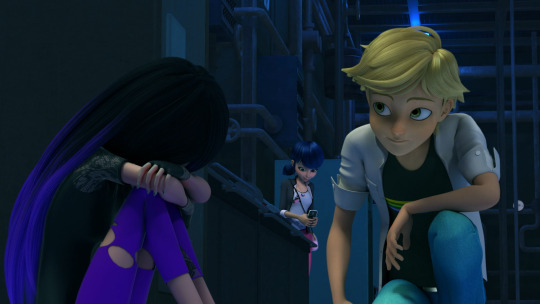
it is i, the overthinker who spends their precious mental energy on a children's show, and i am here to point out an aspect of the characterization of miraculous' main leads that i personally find quite exciting (or else i wouldn't be writing this post): how marinette and adrien relate to and connect with others. as the two characters were designed to be complementary to each other, so their approaches in that regard differ, so here's to diving in that character analysis!
although some use sympathy and empathy interchangeably, the two words connote entirely different ways to experience human connection. sympathy is about sharing others' feelings and experiencing them as if they're your own, but you're limited to only understanding these feelings through your own experience. empathy needs you to put yourself in the other person's shoes, granting an understanding beyond your personal perspective, but without necessarily sharing those feelings.
marinette and adrien are both people pleasers. they value kindness and enjoy helping others. other people's happiness is a source of joy, even at their own expense. the differences, however, lie in how they understand other people, which in turn influences how their kindness towards others manifests.
marinette is sympathetic. the flaw that keeps manifesting in her relationships is that she struggles with understanding other's feelings deeply, because she finds it hard to put herself in other people's place. it's not that marinette is cold, unemotional or selfish; we've seen plenty of times that when someone close to her experiences feelings of sadness or sorrow, marinette immediately gets saddened, too. but a lot of her solutions to relationship conflicts are thought of through a one-size-fits-all lens. there's also the fact that marinette is a proactive character and takes the initiative to console, cheer up, do something special for, save someone and so on, and when she doesn't have the full information, she can come off as silly ('mr. pigeon 72') or even be harmful (the bizarre scene in 'style queen pt. 2' when she makes chloé and her emotionally abusive mother bond over how awful they are?).
marinette loves to show her affection through gifts, so everyone special to her gets to receive something she made with love and care. marinette likes being around others when she's feeling down, so she assumes that everyone likes to be comforted by a group of people when they're sad. marinette has never lost a parent and doesn't know what to say to someone who has, so she confesses her feelings for adrien on the anniversary of his mother's death (to be fair, that was tikki's idea). marinette believes in honesty, so she struggles to understand why someone wouldn't share the same value.
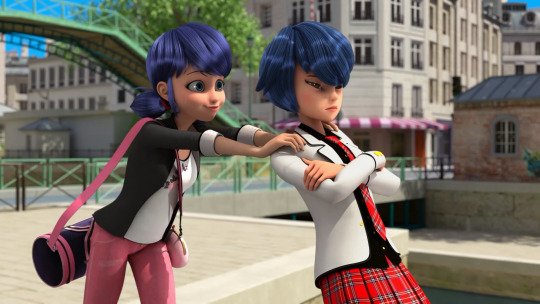
a prime example is 'mr. pigeon 72', where she learns that adrien and kagami have broken up, and immediately assumes that kagami is devastated, but also must rekindle her love for adrien. over the course of the episode, marinette hilariously projects her love for adrien on kagami, along with her own fears and insecurities. she ignores the disappointment that kagami expresses about their failed relationship, and claims that maybe the next course of action - looking into his eyes, seeing him model for the commercial, et cetera - will make kagami fall in love again, in the way marinette is in love with him - wobbly knees, blushes and stammering.
adrien is empathetic. he refrains from making definite judgement about others until he's able to understand where they come from; until then, it's all maybes. he's also less likely to express his support through grand gestures; his approach is rather quiet in comparison to marinette's. adrien's ability to understand other people's perspectives comes with the drawback of how it interacts with other parts of his personality, like his naivety, which mingled with his optimism and hopefulness, can create the prime circumstance for being taken advantage of. he is interested in who people are deep inside, and he also believes there is goodness in everyone. "no one is useless, not even chloé".
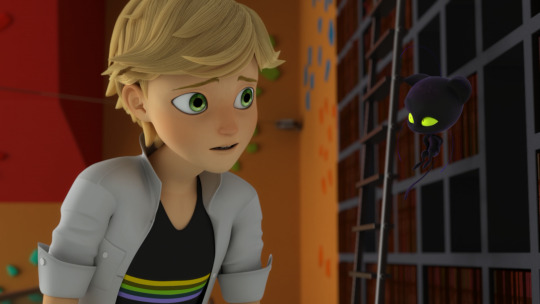
adrien's empathy, combined with his circumstances and the way he was raised, results in him being nearly willfully blind and delusional. he is able to come up with excuses for the way his father is treating him - he's grieving emilie (as if adrien isn't also grieving!), he's busy, he's overprotective. when plagg informs him (if a little harshly) that felix has been scooping around his cousin's room and rummaging through his personal belongings, adrien explains that felix recently lost his father and that must be why he's behaving so weirdly.
adrien's people pleasing ways manifest in putting on personas to make everyone happy. who is adrien agreste? whoever you need him to be. he's the golden child his father demands. he's ladybug's silly and loyal companion, because she needs his jokes and trust. he's nino's best bro. he's the polite teenager that will behave perfectly in the classroom. adrien tailors his approach to be what others want him to be, while marinette goes overboard with showing her love and care, always doing something for someone. being versus doing.
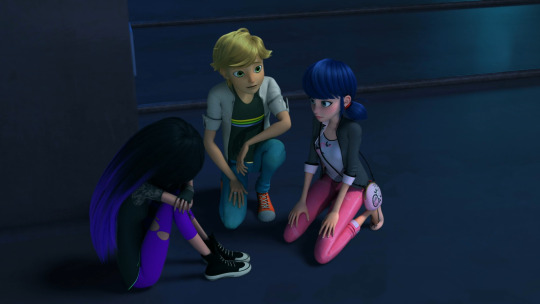
i loved 'guiltrip' for exploring this difference in their characters. marinette runs after an upset juleka and crashes into adrien. she believes that she has said something wrong to upset juleka so much, but adrien reassures her that she doesn't have it in her to say cruel things. when they hear juleka crying, adrien immediately takes charge and asks marinette to stay behind. he slowly approaches juleka and asks her if she's okay. juleka tells him that she'd rather be alone ("you want to be alone? i understand."), but marinette has already sent texts about juleka's hiding place to their classmates, despite juleka's desire to cry in peace. in the end, adrien tells her that she "hung on to that secret as long as [she] could, but it was just too heavy to bear alone", and marinette chimes in with "that's what friends are for". adrien has shifted his approach for the situation, but marinette hasn't.
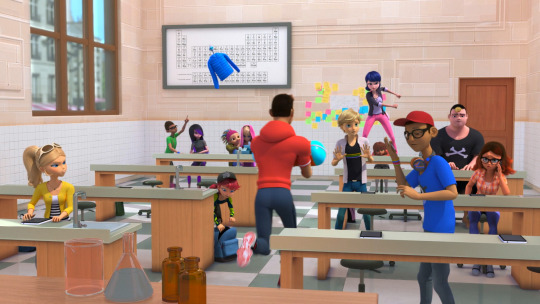
the class clearly cares a lot about juleka and don't want to betray her trust. but they also care about rose and are afraid that she can get ill again. adrien is the only one who abides by rose's wish to not give her any special treatment. marinette, as the assertive class representive, scrambles to organize the class when rose sneezes and they panic; you can hear adrien asking marinette to calm down. both of them care about rose, but they showed that care differently due to the way they perceive information about others' feelings.
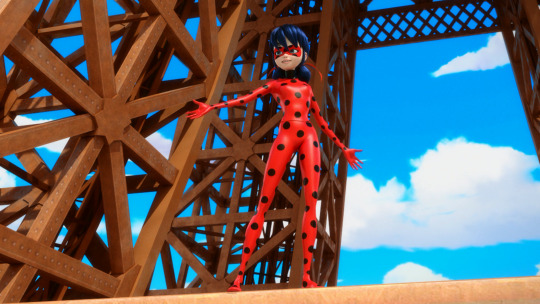
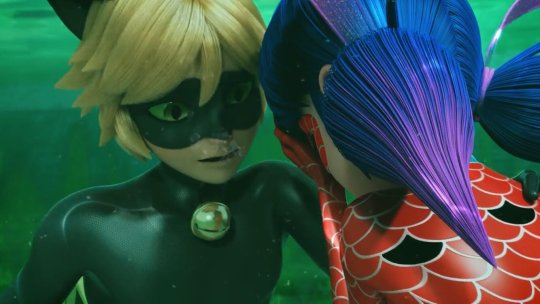
unsurprisingly, this affects their superhero personas and the ladynoir dynamic. marinette's sympathy is why she's able to connect with the masses as ladybug, representing the perfect, serious and reliable superhero, giving grand speeches on top of the eiffel tower, affecting everyone who is watching her. adrien would rather stay behind and connect one-on-one with civilians, leaving ladybug to deal with the press for the most part. there's also the lucky charm that requires marinette to choose the correct path that will solve the riddle and release the akuma. her difficulty with brainstorming many scenarios instead of just one is now her advantage.
there's something poetic about how marinette's anxiety is, for the most part, caused by her feelings for adrien, but adrien is the only person able to calm her down (as chat noir, of course). he validates her feelings of insecurity, and then is able to shift her mindset by introducing a different perspective, something that has come up in all season finales so far.
some people will relate more to marinette. some people will relate more to adrien. it's not that one approach is better than the other, because they both have their weak spots and have to be developed to be strong anyway. but adrien and marinette would be able to learn how to operate in the other's mode because of how strong their bond is, and i think that's great, because it's all about the parallels!
#basically enfj vs infp blah blah blah#long post#miraculous#miraculous ladybug#miraculous: tales of ladybug and chat noir#ml guiltrip#adrien agreste#marinette dupain-cheng#adrienette#ml#ladybug#chat noir#ml meta#ml theory#ml analysis#character study#ml spoilers#ladynoir#love square
1K notes
·
View notes